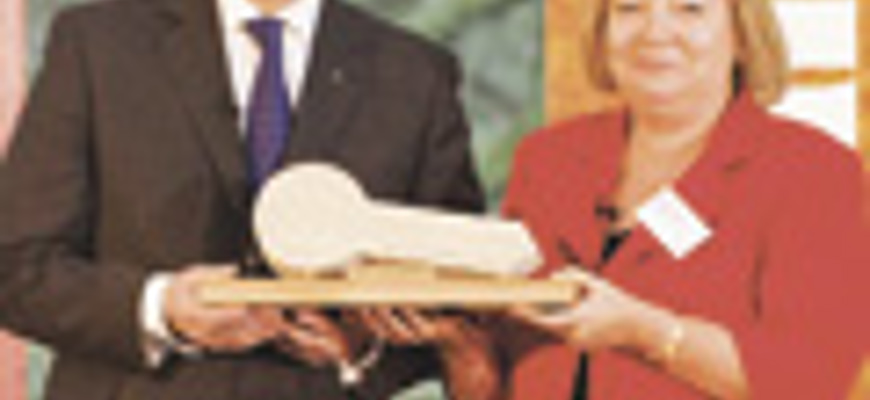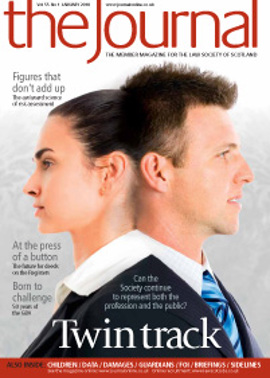One giant leap

Scotland is ready to show the world how to do e-registration. That was the confident message promoted by Registers of Scotland at the official launch of the ARTL system last month.
The profession has known for a few years now that it has been coming, and live transactions have been taking place with increasing frequency since the first successful registration in July 2007, and the first actual property transfer in April 2008. But 15 December 2009 at Our Dynamic Earth, Edinburgh, was when it was announced to the wider world that the first country to introduce a form of state protection for property owners, as Cabinet Secretary John Swinney told a capacity audience, was continuing its tradition of innovation with this ground-breaking development. Only New Zealand, it is said, has anything even approaching what has been developed for Scotland.
Step back for a moment and remind yourself what is involved. No more having to make sure the SDLT certificate comes through before the 21 day period for registration covered by the seller’s letter of obligation expires: SDLT is calculated as part of the transaction and paid automatically by direct debit three days after completion. No more worrying about undisclosed additional standard securities: the state of the title can be confirmed up to the day before and the registration in favour of the purchaser completed within 24 hours. No more bounced applications because of simple errors in the deed or the cheque: the system validates the information submitted as you go through the transaction and, as with SDLT, calculates and takes payment of the registration dues automatically.
All that plus a reduction in work for the submitting firm (much of the information is on the system already), registration dues down by about a third, and savings in paper and postage, not to mention that crucial carbon footprint.
The benefits, Mr Swinney emphasised, are not confined to solicitors or their clients. An efficient land registration system is one of the World Bank’s key measures of a country that is good to do business in, he pointed out, and with up to £50 billion worth of transactions going through the registers in a good year, the new system was an essential part of ensuring that Scotland was well placed to take advantage of economic opportunities. The Scottish Government had put out a challenge to the public sector to identify how to participate in e-business, and the involvement of the SDLT office made an effective partnership providing a good service to the private and commercial sectors.
Joining the Cabinet Secretary on the platform were John Scott of the Society’s Professional Practice team, who said the Society had been proud to have been involved since the birth of the project a decade ago, and was now working with RoS on the future for missives and letters of obligation; Nick John of HMRC’s stamp taxes section, who highlighted the benefits of “joined-up government” through the SDLT interface, which produced a “seamless, streamlined system”; and Brendan Dick of BT, the project’s IT partners, who admitted that it had not been an easy task: processes, attitudes and culture had all had to change, but the achievement was a clear cause for celebration and he looked forward to collaboration from all users in order to drive the system forward.
Impressive though the achievements to date are, there is much more to come, according to Andy Smith, one of the Deputy Keepers, who rounded off the morning with a look at the future. True end-to-end electronic caseworking is the goal, covering all applications including first registrations and sasine entries. Accurate, up-to-date mapping will be critical and a new co-operation agreement with Ordnance Survey was reached this year.
Accelerating the coverage of the Land Register is another ambition. Currently about 55% of individual titles in Scotland, relating to 20% of the land mass, appear on the register, increasing at 2-3% a year, and there may be a move to encourage voluntary registrations in the counties furthest ahead in the process.
Smith also offered a vision of a “one-stop shop for all areas of property ownership”, combining data held by assessors, or relevant to school catchment areas, or showing the location of doctors and dentists, or photographic images…
In truth, ARTL is only the beginning of the new age. Further enquiries, and how to apply, t: 0845 607 0160; e: eservices@ros.gov.uk; w: ros.gov.uk/artl .
Time to take the plunge
Although over 20,000 transactions have now been completed using ARTL, all but a few of these have involved securities only, with no property transfer, and therefore only a single solicitor acting.
With over 300 firms now signed up to ARTL, and RoS having planned their training to bring on clusters of firms together, you might expect that even though both sets of agents to a transaction need to be ARTL-enabled for the clients to benefit from the system, there would by now be a stronger flow of automated dealings with whole. Andy Smith, RoS’s Deputy Keeper, Service Delivery, indeed confirmed to me that the system can cope with any number of live sales.
Brian Inkster of Inksters, Glasgow, says however that he often comes across a reluctance on the other side to commit to ARTL, even if the firm is officially signed up. “Sometimes they are busy and think it will take them longer to remember what to do, or the person who was trained is not available, or they are worried about it not working on settlement day”, he explained. The last mentioned reason is given even though the transaction can be set up in advance, effectively the equivalent of sending the disposition to be held as undelivered pending settlement.
Curiously, he added, it was often easier to get a smaller firm to proceed through ARTL than a larger one.
Duncan Thomson of RoS agreed that there was still a culture change issue to be overcome with many firms – but added that they are monitoring usage by individual firms and will be following up to see whether they need a refresher just to get that little push to take the plunge. RoS even offer to attend at your first live transaction to make sure it goes through smoothly.
Or are we to wait and see which firm becomes the first to have to compensate a client under IPS, because it didn’t get them the reduced registration dues when it could have?
Direct effect
The Dynamic Earth event also celebrated the new, improved Registers Direct service, now upgraded to provide greater stability and some enhanced functions. Available to regular users with an account, or casual enquirers through the Customer Service team (the charge is now only £2, and levied only if matches are found), it can bring to your desktop the information on ownership of any parcel of land in Scotland, as well as a search of the Register of Inhibitions and the Books of Council and Session.
We were shown a customer off the street wanting to find the ownership of a plot on Skye, knowing only the locality and a particular building that it was near. Pulling up the OS map resulted in the subjects being quickly identified, together with their present owners, and the whole title history including entries in the sasine register back to 1905, which confirmed the enquirer’s belief that an older property once stood on the site.
Searchers are freed of the need to maintain an office next to Meadowbank House and to search within opening hours there; local authorities have ready access to ownership information for purposes of serving statutory notices; solicitors in debt recovery work value the same data; those acting for lenders have ready access to property descriptions for drafting securities; the lenders themselves no longer have to store bulky title deeds; anyone can order a low cost copy title plan. These were only some of the benefits identified for users of the service.
Apply to sign up at ros.gov.uk/registersdirect/apply_access_rd.html . Online training available. Further information, t: 0845 607 0160; e: eservices@ros.gov.uk; w: ros.gov.uk/registersdirect .
In this issue
- Forward thinking
- Renewal of transitional guardianships
- End the navel-gazing
- Who speaks for lawyers?
- Reasons to be hopeful
- The full picture
- Hearing and speaking
- Law of unintended consequences
- More prejudicial than probative?
- One giant leap
- If the cap fits
- Half a century of strife
- From the Brussels office
- Law reform update
- Send in the SaaS
- Ask Ash
- Words and sentences
- Two in one
- Enough to turn you to drink
- Uncertain security
- Protections with legs
- Working for the estate
- Home defences
- Splitting from the taxman
- Scottish Solicitors' Discipline Tribunal
- Website review
- Book reviews
- Route to freedom
- Steady as she goes is market forecast






